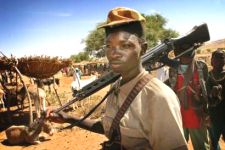Darfur rebel commanders split from group
KHARTOUM, Feb 4 (Reuters) – About 10 Darfur rebel commanders have renounced leadership of the main movement in Sudan’s west, rebel officials said on Friday, raising fears that negotiations for a ceasefire in war-torn Darfur could stutter.

|
|
Sudan Liberation Army (SLA) rebels walk through an unidentified village in the desert west of El Fasher, the capital of North Darfur state, November 8, 2004. (Reuters). |
The Sudan Liberation Army (SLA) is the largest of two main rebel groups fighting the government in Darfur, demanding a more equal distribution of wealth and power. Any splits in its leadership could hurt already fragile talks to end the conflict.
A statement issued on a Sudanese Web site earlier this week, signed by SLA commander Juma’a Mohamed Haggar, said the military field command had renounced the leadership of the movement, which is based in the Eritrean capital Asmara.
“We will very soon be announcing a new secretary-general and chairman,” Haggar’s head of office told Reuters from Darfur on Friday, confirming the Web statement.
The SLA chairman and secretary-general both confirmed the statement but said it posed no threat to the movement.
The humanitarian coordinator for the movement, Suleiman Adam Jamous, told Reuters he had travelled to meet the commanders, but was still waiting to start talks with them.
“There are several commanders with Haggar. There may be 10 of them,” Jamous said by telephone from Darfur, adding he did not think it was a serious threat to the movement.
Asked why the commanders had said they had no confidence in the leadership, Jamous said: “Because of their absence I think.”
After years of tribal conflict two main rebel groups, the SLA and the Justice and Equality Movement, took up arms in early 2003 accusing the government of neglect and of giving Arab tribes preferential treatment.
They say the government armed Arab militias, known as Janjaweed, who the international community hold responsible for widespread rape, and the looting and burning of non-Arab villages.
Khartoum admits arming some militias to fight the rebels but denies any links to the Janjaweed, calling them outlaws.
